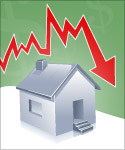
The rate of annual job growth in August, 1.7 percent, was basically the same as in previous months. We had better get used to the idea that this is the new normal, because there probably won't be much help from the lagging government and construction sectors.
Budget difficulties will prevent any meaningful increase in government spending, even though local and state revenues are now in better shape. The recession revealed the extent of unfunded pension liabilities for public employees, which will absorb any extra dollars.
The expected recovery in the construction sector is running up against new realities that will slow hiring. One of these is the falling home-ownership rate, currently 65 percent – down from 69 percent in 2004-05 – and almost certainly going lower. Falling home-ownership just means that more people rent, but for jobs in construction it means slow hiring because apartments can be built with fewer workers. Despite higher home prices this year, only 65 percent of new building permits were for single-family homes, by far the lowest percent in a decade.
Another unhappy reality for construction is that the number of potential home buyers will be restricted for years because so many existing homeowners are either directly underwater with their mortgage or are so far in debt with home equity loans that it amounts to the same thing. When you owe more than your home is worth, you can't afford to sell it, which means you can't afford to buy a new one, either. Americans took on $600 billion of home equity debt and have paid down only 20 percent of that.
Jobs were flat in manufacturing, despite more car production, as consumers move away from PCs. Jobs in retail were up a solid 2.7 percent, jobs in restaurants an even better 3.5 percent. Business services jobs were up 3.4 percent, healthcare jobs up 2 percent. The unemployment rate dropped to 7.3 percent.



